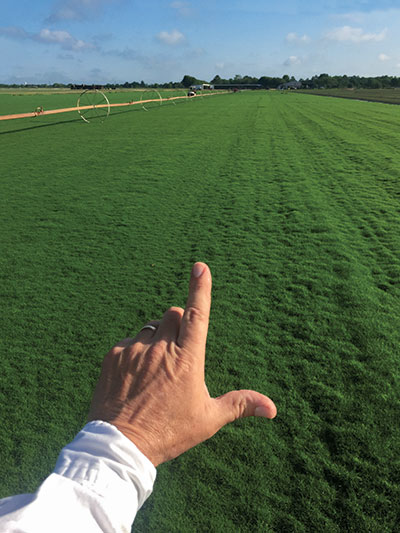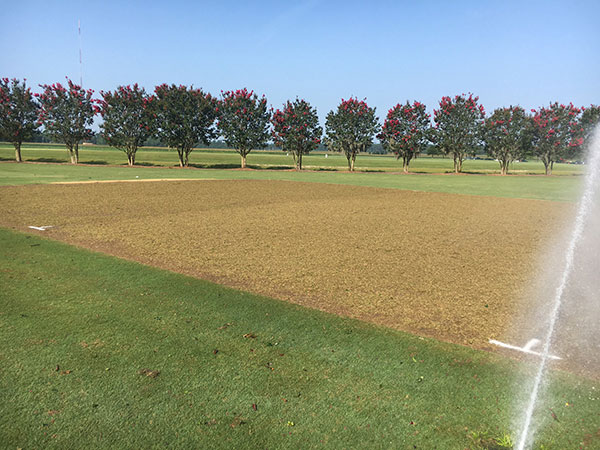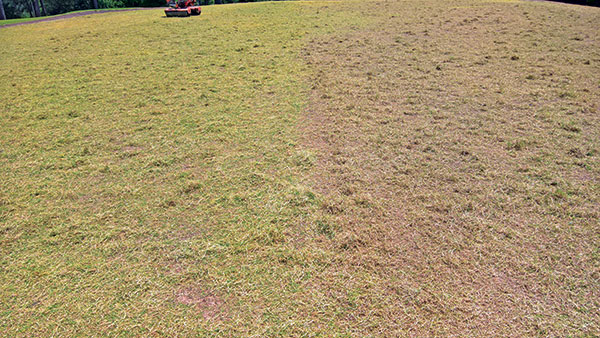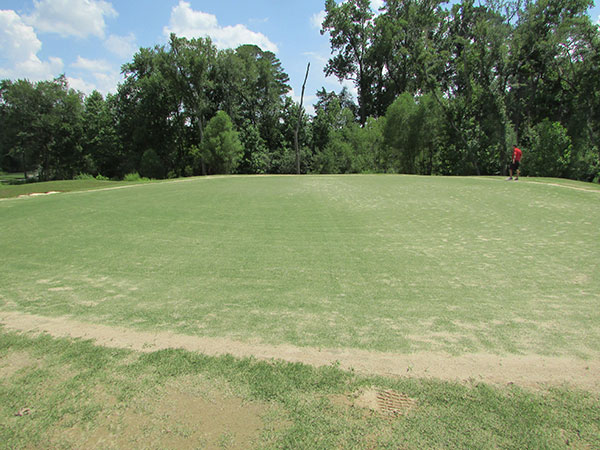Boosting plant health on baby greens

Brown indicates the line between the treated area on the right which was much thicker than the untreated on the left.
As Lexicon’s popularity increases, BASF focuses on benefits it offers newly established greens.
In January 2014, BASF announced that the U.S. Environmental Protection Agency had registered its Lexicon Intrinsic fungicide, a premix product of Insignia comprised of pyraclostrobin (28.58 percent) as well as a new ingredient known as fluxapyroxad (14.33 percent).
Lexicon has since been used regularly on golf course greens because it inhibits mitochondrial respiration, thereby improving greens’ health, along with tolerance to stress (including aeration, drought, heat and humidity) so they can withstand more diseases longer.
As Lexicon’s popularity increased — likely because of its control of 27 cool- and warm-season diseases for up to 28 days — BASF decided to focus on its other benefits as well, such as sprigs and Bermudagrass conversion.
“Lexicon is able to reduce a stress hormone in grass as it blocks it, if it is applied before the stress occurs,” says Brian Thompson, Eastern regional sales manager–T/O, BASF. “Because of its strong history of being a reliable plant health product on existing turf, we began to consider new turf as well. If you’re a sod grower, your customer has the responsibility to maintain the sod. So, the end user sees the value in pre-treating the sods and sprigs, as there is a stress mitigation.”
The Champion Turf experience
As vice president of Champion Turf Farms in Bay City, Texas, Mike Brown and his crew began to test Lexicon on recently developed sprigs in March 2017. They were particularly interested in any differences in stolon performance, and how sprigs would withstand the processes of harvesting, shipping and establishment. The crew applied Lexicon to a test area in the sprig nursery six weeks before they intended to harvest from the field.
Brown chose Lexicon because this spring was a difficult time to grow Bermudagrass along the Gulf Coast — with unseasonably cool and dry weather — and because the area had poor sunlight last fall despite high temperatures, a combination detrimental to Bermudagrass.
“We were really concerned, as we had a full slate of golf courses that we were converting this year, and the sprig supply was already tight,” Brown explains. “When we saw that the areas treated with Lexicon were responding better to the fertility inputs we were making (within four weeks they had grown considerably more than the non-treated areas), we immediately got more and applied it to the other fields.”
After experiencing such success, not only in producing healthier planting stock but also by increasing the yield itself (by roughly 20 percent), Brown and his crew intend to apply Lexicon each year as part of their production protocols.
Clemson partnership

Two plots planted with fresh sprigs at Carolina Fresh Farms. The plot on the left was treated with Lexicon and the nearer plot on the right was untreated.
During the winter of 2015, Carolina Fresh Farms, a 2,000-acre sod farm located in South Carolina, purchased NewLife Turf and continued to operate it as a sod production facility that mainly installed green surfaces of TifEagle Bermudagrass.
After the purchase was complete, Mills Grant, horticulturist at Carolina Fresh Farms, considered new methods that could grow NewLife Turf’s sprigged and sodded greens faster and more efficiently. After speaking to Bruce Martin, Ph.D., professor of plant and environmental science at Clemson University, he decided to apply Lexicon to his sprigs to protect them from pathogens.
“We must keep the new sprigs moist for up to two weeks, depending on the environment, but consistent and constant moisture during warm, humid weather definitely increases the development and spread of potential fungi in the native soil,” Grant states. “Why not treat the sprigs with a fungicide immediately after planting, or, better yet, prior to delivery to help combat the potential of disease?”
Shortly after purchasing Lexicon, Grant decided to provide sprigs that were treated with Lexicon (as well as sprigs that were not) to Martin so he could conduct a clinical trial. Since then, the sprigs — which were treated with Lexicon seven days prior to harvest — have been installed at the university and are now being studied. The university has found that the application of Lexicon prior to the harvest of sod and sprigs improves health enough to aid in quick establishment.
At NewLife Turf itself, Grant has noticed greener sprigs and planting stock. In fact, the sprigs treated with Lexicon have been handling the stress of recent warm temperatures better than the untreated sprigs.
“To date, we have provided Lexicon-treated sprigs to three construction projects,” Grant adds. “There is no doubt that the sprigs certainly present themselves as healthier planting stock when compared to the untreated stock. And as we strive to maintain the previous successes of NewLife, Lexicon will help us continue to provide the best sod product possible.”
Protecting newly established greens
Regardless of the field of agriculture, preventative disease control is crucial at the time of planting. Fungicides are, more often than not, used either on seeds or drenched into seed furrows. Without such control, soil-borne illnesses like Pythium root rot may damage crops, produce uneven stands and reduce yield.
According to Martin, newly established golf greens are no different. But they have not received much attention from formal research — until now.
“BASF is trying to alleviate that through their work with Lexicon,” Martin says. “After all, disease protection for plant material being used to establish new greens should be a fundamental consideration.”
Sod farms typically provide Bermudagrass sprigs that are washed free of soil and packaged in refrigerated storage. The sprigs, prior to shipping and planting, still can harbor undetected pathogens. It’s vital to use a fungicide that penetrates plant organs and carries over into newly planted material after sod is treated on a farm and harvested for sprigs. In doing so, the newly planted green will have early vigor and will establish rapidly.
“Harvested sprigs will also be more tolerant of the stress that occurs during sprig harvest and subsequent planting,” Martin continues. “In addition, since both components of Lexicon penetrate the plant, it controls diseases longer than fungicides that don’t penetrate.”
Martin also has talked with several golf course superintendents and found that they prefer grow-ins to be completed as soon as possible.
“Quick establishment allows the green to be brought back into play faster, so revenue becomes available sooner,” he says. “It also allows more time for rhizome development in Bermudagrass, which provides a healthier base of turf for overseeding or survival in Transition Zone environments.”
He adds, “In tropical and Transition Zone environments, the quicker the turf matures, the more resilient it becomes to cultural practices like constant topdressing, low mowing and verticutting.”
Establishment at Pinehurst No. 7

On four of Pinehurst No. 7’s new greens, half of the sprigs were treated with Lexicon (left) and half were untreated.
In preparation for new green establishment at Pinehurst (N.C.) Resort’s No. 7 course in 2017, superintendent Steve Wilson and his crew decided to use sprigs that were treated with Lexicon twice at Champion Turf Farms, with one treatment 28 days before harvest and another 23 days later.
Once harvested, the sprigs were transported and installed on some of Pinehurst No. 7’s greens. Since then, the treated sprigs have had a better appearance, and have more green tissue when compared to untreated sprigs.
“We took four greens and sprigged half of them with Lexicon-treated sprigs and half with non-treated,” Wilson says. “The Lexicon treated-sprigs have been much more vibrant in color.”
Likely because of better establishment, the treated sprigs also have grown in better than the non-treated. In fact, four weeks after installation, the greens with treated sprigs have had more turf coverage as well.
“On the non-treated side of one particular green, 35 plugs were used to replace areas washed out by a storm,” Wilson states. “The Lexicon-treated side of the green had spots, but none were big enough to need plugging, though, which greatly reduced our labor during the grow-in process.”
Wilson and his staff also have sprayed sections of the four greens with Lexicon twice since installation.

The Lexicon treated sprigs on the left are looking greener and fuller compared to the non-treated sprigs on the right.
“By using Lexicon in this way, grow-in and establishment will continue to speed up,” he explains. “I also believe the greens will be able to withstand the stresses of daily play once they’re used by golfers again.”
Success at Old Memorial
During the summer of 2015, Superintendent Trent Inman decided to use Lexicon throughout the grow-in of the greens at Old Memorial Golf Club, Tampa, Fla. He divided the greens roughly in thirds. After the first mowing, the crew sprayed the first third with another manufacture’s product combined with fertilizer. The second third was sprayed only with fertilizer, but the final third was sprayed with Lexicon and a fertilizer at a rate of 21 ounces per acre.
“At the time, the results from the three different applications were not overly different,” Inman says. “However, after a couple months, I noticed that the final third — the Lexicon/fertilizer combination — seemed to have the most density among all of the greens. I thought enough of the difference that I made another Lexicon application to all of the greens that fall.”
Since then, Inman has based most of his fungicide applications on Lexicon first. He starts with it, then works other products in around it, as it has such a broad spectrum of control.
“We have different disease pressures year round, and I feel Lexicon has the largest spectrum of control to help us every month,” Inman adds. “I would highly recommend any superintendent to make Lexicon their base fungicide all year long.”
Photos by: Mike Brown, Mills Grant, Steve Wilson









